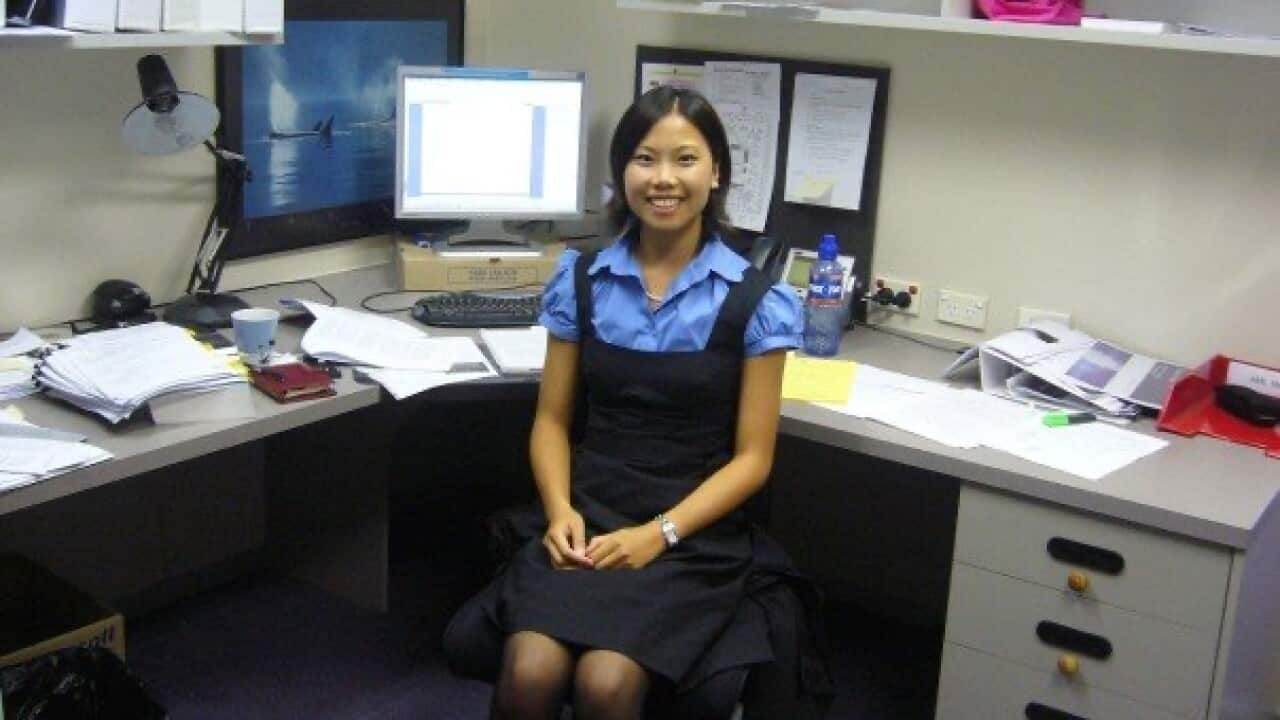Later at university, Qin joined so many societies and events that “people thought I had political aspirations, rather than the beginnings of full-blown workaholism”.

Qin Qin poses with her parents on the day when she qualified as a solicitor. Source: Supplied
When asked what she did on her weekends, her answer was “homework”.
Yet when she was hired by a law firm, Qin applied to be assigned to banking and finance or mergers and acquisitions, because they were the most prestigious areas — and also the most demanding. She was soon working 10 hours a day, six days a week.
Working to repay her parents — and the country
She also felt “happiness duty”, a term coined by academic Sara Ahmed to describe the pressure placed on migrants to be constantly smiling and grateful for their opportunities.
There’s this internalisation of the sacrifices of our parents who migrated here
Qin Qin
“There was pressure that I didn’t even realise I was being driven by.”
The ‘model minority’ stereotype ‘hurts and harms’
“It refers to Asians being law-abiding, not rocking the boat and apparently ‘successful’, which hides so many of the things that Asians go through.”
(The) model minority is a myth and a stereotype that hurts and harms everyone in a multicultural society such as Australia
Qin Qin
“I had never thought to question her authority,” Qin wrote.

Qin Qin is the author of the book Model Minority Gone Rogue. Source: Supplied / Benjamin Ling
Vietnamese-Australian solicitor Tu Le, who was named the overall winner of the 2022 Under 40 Most Influential Asian-Australian Awards, relates to many of Qin’s experiences.
“It wasn’t anyone telling me to do it but I think that personal expectation, that [it] somehow proves my loyalty, my willingness to go above and beyond.”

Tu Le works at the Marrickville Legal Centre in Sydney Source: Supplied
The worry of not being valued and the constant pressure to prove yourself can directly impact people’s feelings of self-worth, said Psyched Solutions mental health strategic policy professional Sharon Orapeleng.
“If you’re consistently stressed because you’re overworked, you’re burnt out, you’re always pleasing [other people], giving more of yourself without refilling your cup because you want to be seen in the workplace — that is going to damage not only your physical health but your mental health,” Orapeleng told SBS News.
Other migrants battle negative stereotypes
“Often you hear that migrants are abusing systems, there’s a narrative that you come [to Australia] and you’re on Centrelink,” she said. “How many times have people heard ‘you should be so grateful that you’re in Australia’?”
“That’s a heavy burden to carry.”

Sharon Orapeleng says when workers don’t feel able to bring their full self to work, it could damage their physical and mental health. Source: Supplied
Diversity Council Australia chief executive officer Lisa Annese said employees with migrant backgrounds often had the additional pressure of working in their second language, yet didn’t benefit from the same access to recognition, promotion and pay rises.
“Lots of people are overqualified and underemployed, and are treated as though they are lower status.”
“I think they’re shifting [recruitment] to look at how people are a ‘cultural add’ as opposed to a ‘cultural fit’,” she said.
The right to speak out
“My life here [in Australia] was based on a prime minister’s tears,” she said, of Bob Hawke’s public display of emotion on Australian TV while describing the massacre of pro-democracy protesters in Tiananmen Square.

Bob Hawke became emotional speaking about the Tiananmen Square massacre. Source: ABC Australia
“But what were those tears for? Those tears were for the students who were crushed, for freedom of speech, for democracy.
“They were just fighting for their right to speak out.”
